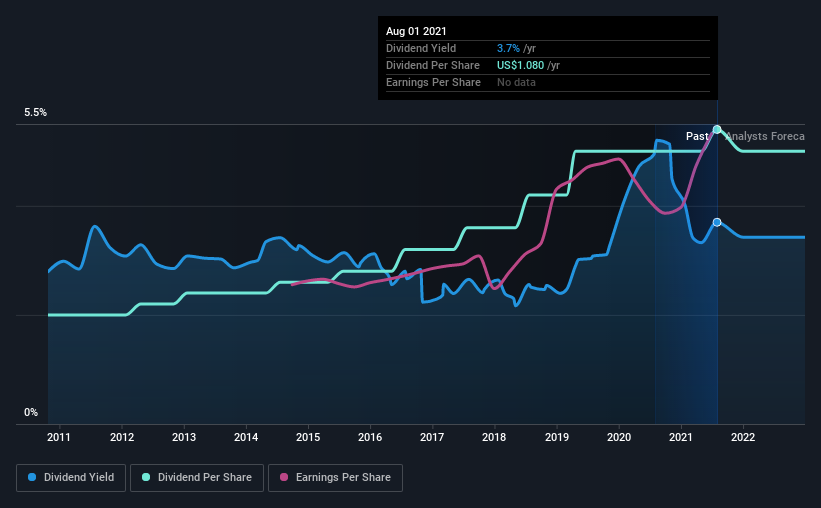Is It Smart To Buy First Community Bankshares, Inc. (NASDAQ:FCBC) Before It Goes Ex-Dividend?
Readers hoping to buy First Community Bankshares, Inc. (NASDAQ:FCBC) for its dividend will need to make their move shortly, as the stock is about to trade ex-dividend. The ex-dividend date is usually set to be one business day before the record date which is the cut-off date on which you must be present on the company's books as a shareholder in order to receive the dividend. The ex-dividend date is important because any transaction on a stock needs to have been settled before the record date in order to be eligible for a dividend. This means that investors who purchase First Community Bankshares' shares on or after the 6th of August will not receive the dividend, which will be paid on the 23rd of August.
The company's upcoming dividend is US$0.27 a share, following on from the last 12 months, when the company distributed a total of US$1.08 per share to shareholders. Calculating the last year's worth of payments shows that First Community Bankshares has a trailing yield of 3.7% on the current share price of $29.2. If you buy this business for its dividend, you should have an idea of whether First Community Bankshares's dividend is reliable and sustainable. So we need to check whether the dividend payments are covered, and if earnings are growing.
View our latest analysis for First Community Bankshares
If a company pays out more in dividends than it earned, then the dividend might become unsustainable - hardly an ideal situation. Fortunately First Community Bankshares's payout ratio is modest, at just 38% of profit.
When a company paid out less in dividends than it earned in profit, this generally suggests its dividend is affordable. The lower the % of its profit that it pays out, the greater the margin of safety for the dividend if the business enters a downturn.
Click here to see how much of its profit First Community Bankshares paid out over the last 12 months.
Have Earnings And Dividends Been Growing?
Businesses with strong growth prospects usually make the best dividend payers, because it's easier to grow dividends when earnings per share are improving. If business enters a downturn and the dividend is cut, the company could see its value fall precipitously. Fortunately for readers, First Community Bankshares's earnings per share have been growing at 15% a year for the past five years.
Many investors will assess a company's dividend performance by evaluating how much the dividend payments have changed over time. In the last 10 years, First Community Bankshares has lifted its dividend by approximately 10% a year on average. It's exciting to see that both earnings and dividends per share have grown rapidly over the past few years.
To Sum It Up
Is First Community Bankshares an attractive dividend stock, or better left on the shelf? Typically, companies that are growing rapidly and paying out a low fraction of earnings are keeping the profits for reinvestment in the business. This strategy can add significant value to shareholders over the long term - as long as it's done without issuing too many new shares. First Community Bankshares ticks a lot of boxes for us from a dividend perspective, and we think these characteristics should mark the company as deserving of further attention.
With that in mind, a critical part of thorough stock research is being aware of any risks that stock currently faces. For example, we've found 1 warning sign for First Community Bankshares that we recommend you consider before investing in the business.
We wouldn't recommend just buying the first dividend stock you see, though. Here's a list of interesting dividend stocks with a greater than 2% yield and an upcoming dividend.
This article by Simply Wall St is general in nature. It does not constitute a recommendation to buy or sell any stock, and does not take account of your objectives, or your financial situation. We aim to bring you long-term focused analysis driven by fundamental data. Note that our analysis may not factor in the latest price-sensitive company announcements or qualitative material. Simply Wall St has no position in any stocks mentioned.
Have feedback on this article? Concerned about the content? Get in touch with us directly. Alternatively, email editorial-team (at) simplywallst.com.

